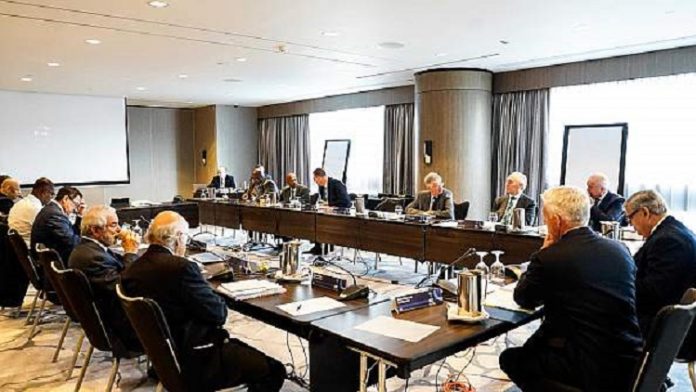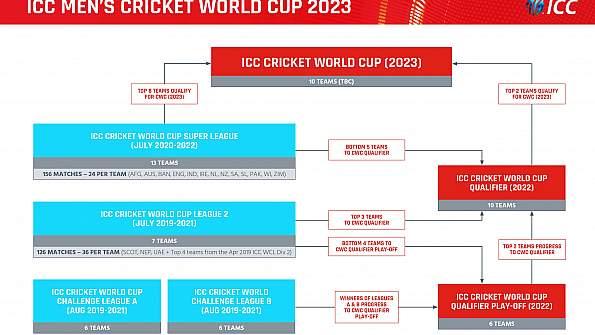
Qualification for the 2023 Men’s World Cup will be significantly different from how it has been. A three-step process has been included whereby 32 teams will partake in an elaborate qualification process involving 372 matches overall starting from July 2019 till May 2022. Out of this the eight teams from the CWC Super League, consisting of 13 teams will earn direct qualification while the bottom five will play a CWC qualifier, involving five more teams. The newly designed structure will see more ODI games for seven Associate Members.
As it stands, the 2023 World Cup, just like the 2019 one, will be a ten-team affair. But that could be up for discussion at a later stage.
ICC Launches Global Women’s T20I Team Rankings
The International Cricket Council today launched a global MRF Tyres ICC Women’s T20I Team Rankings…

The ICC has come under criticism previously for restricting the 2019 World Cup to a ten-team affair. Associate Members felt significantly dismayed by the decision to restrict and not expand the World Cup playing teams. ICC’s CEO Dave Richardson feels that this move will cater to the earlier demands.
“To date the World Cricket League has played an important role in improving standards in Associate Member cricket, but feedback from our consultation with Members clearly articulated the need for more frequent playing opportunities and greater certainty over when they would be playing.
“The new structure significantly increases the number of matches and competitive playing opportunities for our Members as well as shortening the whole qualification process to two and a half years, when previously it was six. There is a clear pathway now for teams looking to qualify for the ICC Men’s Cricket World Cup,” he said.
The new structure allows even the bottom-ranked team (out of 32) a chance to become one of the two teams to play in the World Cup while also making sure that there is a substantial increase in ODI and List A cricket played by the lower-ranked teams through the newly-designed pathway.
Read More: ICC releases latest version of DLS system
No pathway for Test cricket?
Additionally, there could be a standstill in new teams getting Test status, with the ICC deciding to ask it’s members if they’d be interested in continuing to play multi-day cricket such as the Intercontinental Cup.
“Following consultation with Members, it has been agreed in respect to multi-day cricket, that the ICC will now seek Expressions of Interest from Members who have previously competed in the I-Cup and / or World Cricket League Championship, who are keen and committed to playing the multi-day format. Following this, a structured multi-day competition on a cost-sharing basis will be proposed giving Members the choice of playing longer form cricket,” ICC stated.
Qualification for Women’s World Cup
All ten teams with ODI status will be part of the next ICC Women’s Championship, beginning post-2021 World Cup, as opposed to just the top-eight currently. As of now, the ninth and tenth ranked Bangladesh and Ireland don’t feature in IWC (ICC Women’s Championship) that offers a shot at direct qualification for the 50-overs megaevent.
Read More: Herath, Prasad, Mendis and Kulasekara start Coaching
There will also be a change in the qualification procedure for the 2021 Women’s World Cup, with top-five teams gaining automatic entry – including the hosts – as opposed to the existing rule of four. The event, however, remains an eight-team affair.
“It was confirmed that there will be a qualifying event in all five ICC regions with the top team in each region progressing to the ICC Women’s Cricket World Cup Qualifier / ICC Women’s World T20 Qualifier,” stated ICC. The eight-team 2021 World Cup will see a qualifier round that will consist of three bottom-placed teams from ICC Women’s Championship 2017-20, Bangladesh, Ireland and the five regional winners vying for the three remaining spots.
These decisions were taken in the ICC Board and Committee meetings in Singapore.



















